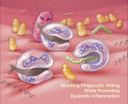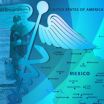(Press-News.org) The human body is comprised of roughly 10 times more bacterial cells than human cells. In healthy people, these bacteria are typically harmless and often helpful, keeping disease-causing microbes at bay. But, when disturbances knock these bacterial populations out of balance, illnesses can arise. Periodontitis, a severe form of gum disease, is one example.
In a new study, University of Pennsylvania researchers show that bacteria responsible for many cases of periodontitis cause this imbalance, known as dysbiosis, with a sophisticated, two-prong manipulation of the human immune system.
Their findings, reported in the journal Cell Host & Microbe, lay out the mechanism, revealing that the periodontal bacterium Porphyromonas gingivalis acts on two molecular pathways to simultaneously block immune cells' killing ability while preserving the cells' ability to cause inflammation. The selective strategy protects "bystander" gum bacteria from immune system clearance, promoting dysbiosis and leading to the bone loss and inflammation that characterizes periodontitis. At the same time, breakdown products produced by inflammation provide essential nutrients that "feed" the dysbiotic microbial community. The result is a vicious cycle in which inflammation and dysbiosis reinforce one another, exacerbating periodontitis.
George Hajishengallis, a professor in the Penn School of Dental Medicine's Department of Microbiology, was the senior author on the paper, collaborating with co-senior author John Lambris, the Dr. Ralph and Sallie Weaver Professor of Research Medicine in the Department of Pathology and Laboratory Medicine in Penn's Perelman School of Medicine. Collaborators included Tomoki Maekawa and Toshiharu Abe of Penn Dental Medicine.
Work by Hajishengallis's group and collaborators had previously identified P. gingivalis as a "keystone pathogen." Drawing an analogy from the field of ecology, in which a species such as a grizzly bear is thought of as a keystone species because of the influence it has over a number of other species in the community, the idea suggests that, although P. gingivalis may be relatively few in number in the mouth, their presence exerts an outsized pull on the overall microbial ecosystem. Indeed, the team has shown that, although P. gingivalis is responsible for instigating the process that leads to periodontitis, it can't cause the disease by itself.
"Scientists are beginning to suspect that keystone pathogens might be playing a role in irritable bowel disease, colon cancer and other inflammatory diseases," Hajishengallis said. "They're bugs that can't mediate the disease on their own; they need other, normally non-pathogenic bacteria to cause the inflammation."
In this study, they wanted to more fully understand the molecules involved in the process by which P. gingivalis caused disease.
"We asked the question, how could bacteria evade killing without shutting off inflammation, which they need to obtain their food," Hajishengallis said.
The researchers focused on neutrophils, which shoulder the bulk of responsibility of responding to periodontal insults. Based on the findings of previous studies, they examined the role of two protein receptors: C5aR and Toll-like receptor-2, or TLR2.
Inoculating mice with P. gingivalis, they found that animals that lacked either of these receptors as well as animals that were treated with drugs that blocked these receptors had lower levels of bacteria than untreated, normal mice. Blocking either of these receptors on human neutrophils in culture also significantly enhanced the cells' ability to kill the bacteria. Microscopy revealed that P. gingivalis causes TLR2 and C5aR to physically come together.
"These findings suggest that there is some crosstalk between TLR2 and C5aR," Hajishengallis said. "Without either one, the bacteria weren't as effective at colonizing the gums."
Further experiments in mice and in cultured human neutrophils helped the researchers identify additional elements of how P. gingivalis operates to subvert the immune system. They found that the TLR2-C5aR crosstalk leads to degradation of the protein MyD88, which normally helps clear infection. And in a separate pathway from MyD88, they discovered that P. gingivalis activates the enzyme PI3K through C5aR-TLR2 crosstalk, promoting inflammation and inhibiting neutrophils' ability to phagocytose, or "eat," invading bacteria.
Inhibiting the activity of either PI3K or a molecule that acted upstream of PI3K called Mal restored the neutrophils' ability to clear P. gingivalis from the gums.
"P. gingivalis uses this connection between C5aR and TLR2 to disarm and dissociate the MyD88 pathway, which normally protects the host from infection, from the proinflammatory and immune-evasive pathway mediated by Mal and PI3K," Hajishengallis said.
Not only does the team's discovery open up new targets for periodontitis treatment, it also suggests a bacterial strategy that could be at play in other diseases involving dysbiosis.
INFORMATION:
Additional co-authors included Jennifer L. Krauss and Ravi Jotwani of the University of Louisville, who were former members of the Hajishengallis lab; Martha Triantafilou and Kathy Triantafilou of Cardiff University School of Medicine; Ahmed Hashim and Michael A. Curtis of Queen Mary University of London; and Shifra Hoch and Gabriel Nussbaum of Hebrew University.
The research was supported by the National Institutes of Health, European Commission and Medical Research Council.
Gum disease bacteria selectively disarm immune system, Penn study finds
2014-06-11
ELSE PRESS RELEASES FROM THIS DATE:
Migrating north may trigger immediate health declines among Mexicans
2014-06-11
PRINCETON, N.J.—Mexican immigrants who relocate to the United States often face barriers like poorly paying jobs, crowded housing and family separation. Such obstacles – including the migration process itself – may be detrimental to the health of Mexican immigrants, especially those who have recently moved.
A study led by Princeton University's Woodrow Wilson School of Public and International Affairs finds that Mexican immigrants who relocate to the United States are more likely to experience declines in health within a short time period compared with other Mexicans. ...
New study finds Internet not responsible for dying newspapers
2014-06-11
We all know that the Internet has killed the traditional newspaper trade, right? After all, until the general population started interacting with the web in the mid-90s, the newspaper business was thriving—offering readers top notch journalism and pages of ads.
But a recently-published study finds that we may be all wrong about the role of the Internet in the decline of newspapers.
According to research by University of Chicago Booth School of Business Professor Matthew Gentzkow, assumptions about journalism are based on three false premises.
In his new paper, "Trading ...
Study shows Deepwater Horizon crude oil impairs swimming performance of juvenile mahi-mahi
2014-06-11
VIDEO:
This shows juvenile Mahi-mahi in swim tunnel, which allows scientists to monitor metabolic rate swim performance.
Click here for more information.
MIAMI – A new study led by University of Miami (UM) Rosenstiel School of Marine and Atmospheric Science scientists showed up to a 37% decrease in overall swimming performance of Deepwater Horizon oil-exposed juvenile mahi-mahi. The findings reveal the toxic effects of crude oil on ecologically and commercially valuable fish ...
Survey: Almost all adult Texans knew about Health Insurance Marketplace during open enrollment
2014-06-11
HOUSTON – (June 11, 2014) – Almost all adult Texans were aware of the Affordable Care Act's Health Insurance Marketplace before the open-enrollment period ended March 31, according to a report released today by Rice University's Baker Institute for Public Policy and the Episcopal Health Foundation.
The report also found that an estimated 2 million Texans looked for information about the Marketplace and found the federal healthcare.gov website generally helpful. Almost half of Texans who visited the site wanted to purchase insurance or check their eligibility for a ...
White bread helps boost some of the gut's 'good' microbes
2014-06-11
White-bread lovers take heart. Scientists are now reporting that this much-maligned food seems to encourage the growth of some of our most helpful inhabitants — beneficial gut bacteria. In addition to this surprising find, their study in ACS' Journal of Agricultural and Food Chemistry also revealed that when looking at effects of food on our "microbiomes," considering the whole diet, not just individual ingredients, is critical.
Sonia González and colleagues note that the bacteria in our guts, or our microbiome, play an important role in our health. When certain populations ...
Researchers uncover common heart drug's link to diabetes
2014-06-11
Hamilton, ON (June 11, 2014) - McMaster University researchers may have found a novel way to suppress the devastating side effect of statins, one of the worlds' most widely used drugs to lower cholesterol and prevent heart disease.
The research team—led by Jonathan Schertzer, assistant professor of Biochemistry and Biomedical Sciences and Canadian Diabetes Association Scholar—discovered one of the pathways that link statins to diabetes. Their findings could lead to the next generation of statins by informing potential combination therapies while taking the drug.
Approximately ...
Study identifies risk factors for hospital readmissions
2014-06-11
WINSTON-SALEM, N.C. – June 11, 2014 – Hospital readmission, an important measure of quality care, costs the United States an estimated $17 billion each year. And according to the Centers for Medicare and Medicaid Services (CMS), about half of those readmissions could be avoided.
Therefore, there is significant interest in identifying factors that influence readmission rates, especially those that can be identified prior to discharge.
To pinpoint which stroke patients are most at risk, researchers at Wake Forest Baptist Medical Center undertook a retrospective case-control ...
Peer pressure is weaker for kids to quit smoking
2014-06-11
Adolescents tend to be more powerful in influencing their friends to start smoking than in helping them to quit, according to sociologists.
In a study of adolescent friendship networks and smoking use over time, the researchers found that friends exert influence on their peers to both start and quit smoking, but the influence to start is stronger.
"What we found is that social influence matters, it leads nonsmoking friends into smoking and nonsmoking friends can turn smoking friends into nonsmokers," said Steven Haas, associate professor of sociology and demography, ...
Sun emits 3 X-class flares in 2 days
2014-06-11
On June 11, 2014, the sun erupted with its third X-class flare in two days. The flare was classified as an X1.0 and it peaked at 5:06 a.m. EDT. Images of the flare were captured by NASA's Solar Dynamics Observatory. All three flares originated from an active region on the sun that recently rotated into view over the left limb of the sun.
To see how this event may affect Earth, please visit NOAA's Space Weather Prediction Center at http://spaceweather.gov, the U.S. government's official source for space weather forecasts, alerts, watches and warnings.
To see a video ...
Harvard study finds substance abuse & mental health problems in MSM interfere with HIV medication adherence
2014-06-11
New Rochelle, NY, June 11, 2014—Men who have sex with men (MSM) account for more than 60% of HIV infections in the U.S. and 78% of new infections in men. Antiretroviral therapy can control HIV infection and suppress viral load, but mental health and substance abuse problems common among MSM can interfere with medication adherence. How conditions such as depression and alcohol and drug abuse can affect anti-HIV therapy and the success of various interventions are explored in an article published in LGBT Health, a peer-reviewed journal from Mary Ann Liebert, Inc., publishers. ...




